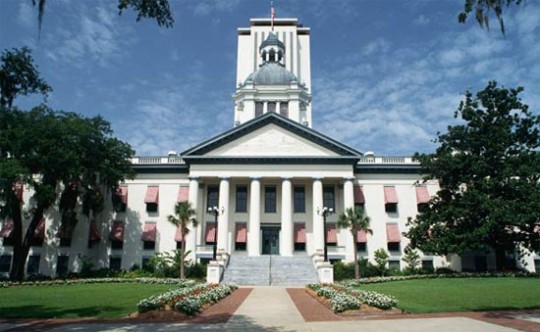Ten Issues To Watch In Florida’s 2018 Legislative Session
January 7, 2018
Florida lawmakers will start the 2018 legislative session Tuesday, with Gov. Rick Scott giving his annual State of the State address.
During the subsequent two months, the House and Senate will negotiate a state budget and consider hundreds of bills. Here are 10 big issues to watch as the session moves forward:
BUDGET: Scott has proposed an $87.4 billion spending plan for the fiscal year that starts July 1. The proposal includes politically popular ideas such as boosting education funding and providing tax cuts. But the proposal is only a starting point for lawmakers, who are expected to face a tight budget. A September analysis estimated a slim $52 million surplus for the coming year — and that did not account for the state’s costs from Hurricane Irma.
ENVIRONMENT: Eyeing money from a 2014 constitutional amendment about land and water conservation, lawmakers will consider a series of proposals that could shield property from development and restore waterways. For example, Senate budget chief Rob Bradley, R-Fleming Island, has proposed spending $100 million a year on the Florida Forever program and wants to set aside $50 million a year for the restoration of the St. Johns River, its tributaries and the Keystone Heights lake region in North Florida.
HEALTH CARE: House Republican leaders likely will renew a push to ease health-care regulations, an effort they say would help increase access to care and lower costs. Examples include eliminating the “certificate of need” approval process for hospital building projects and ending a restriction on patients staying overnight at ambulatory surgical centers. Such proposals, however, have died in recent years in the Senate amid opposition from parts of the hospital industry.
HIGHER EDUCATION: Senate President Joe Negron, R-Stuart, has made a top priority of revamping the higher-education system and will continue seeking changes during his final term. Senators are expected to quickly approve a bill that would make permanent an expansion of Bright Futures scholarships and take steps to further bolster need-based aid. Negron also wants changes such as holding universities to a four-year graduation standard in performance funding.
HURRICANE IRMA: When Hurricane Irma smashed into Florida on Sept. 10, it reset priorities for the 2018 legislative session. Lawmakers are considering dozens of ideas for responding to Irma and preparing for future storms. For instance, they are looking at possibly providing financial help to the agriculture industry, which took at least a $2.5 billion hit in Irma. They also will grapple with Scott’s push to require long-term care facilities to have generators and fuel to keep buildings cool when electricity goes out.
INSURANCE: Insurance lobbyists will try to persuade lawmakers to revamp laws dealing with a controversial practice known as “assignment of benefits,” which the industry blames for increased property-insurance costs. The practice involves policyholders signing over benefits to contractors, who then pursue payment from insurers — often leading to disputes and lawsuits. Lawmakers also will consider renewed proposals to eliminate the state’s no-fault auto insurance system.
K-12 EDUCATION: House Speaker Richard Corcoran, R-Land O’ Lakes, has made clear he wants to continue expanding school-choice programs, which draw opposition from Democrats and many public-school officials. The House has started moving forward with a bill that would offer voucher-like scholarships to students who are bullied in public schools. Meanwhile, the House and Senate face a key budget disagreement on the use of increased property-tax revenues in funding public schools.
OPIOID EPIDEMIC: With overdoses skyrocketing and families being torn apart, lawmakers will look for ways to address the state’s opioid epidemic. Scott wants to spend $53 million to address the issue, with much of the money going to substance-abuse treatment. Scott and lawmakers also could place limits on initial opioid prescriptions that doctors write for patients. The idea is to prevent patients from getting hooked on prescription painkillers and then moving onto potentially deadly street drugs.
TAX CUTS: Since taking office in 2011, Scott has made cutting taxes a hallmark of his administration. As he enters his final legislative session, Scott has proposed $180 million in tax and fee cuts. The proposal, however, does not include major changes in the tax system. Instead, it includes a 10-day sales tax “holiday” for back-to-school shoppers and reductions in motorist-related fees, including fees for obtaining and renewing driver’s licenses.
TEXTING WHILE DRIVING: Lawmakers in recent years have repeatedly rejected efforts to toughen the state’s ban on texting while driving. But the issue has a better chance of passing during the 2018 session after Corcoran announced that he supports making texting while driving a “primary” offense. Currently, it is a “secondary” offense, meaning motorists can only be cited if they are pulled over for other reasons. But if it is a primary offense, police would be able to stop motorists for texting behind the wheel.
by Jim Saunders, The News Service of Florida
Comments
2 Responses to “Ten Issues To Watch In Florida’s 2018 Legislative Session”




I agree that something needs to be done about the opiod problem, but they don’t need to take them away from the people who need them, and don’t abuse them. If they plan on limiting pain meds, why not limit alcohol consumption to one drink at bars? This would cut down on dui’s, and alcohol related problems.
Need to make texting while driving a criminal charge the same as DUI